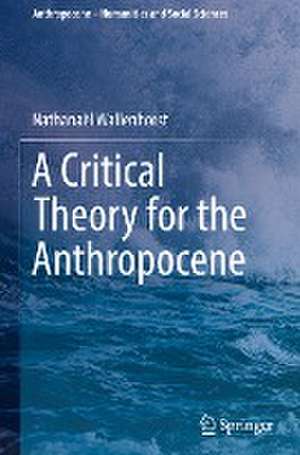A Critical Theory for the Anthropocene: Anthropocene – Humanities and Social Sciences
Autor Nathanaël Wallenhorsten Limba Engleză Hardback – 16 sep 2023
The intellectual and political attitude outlined in this book is an extension of critical theory: the work also puts forward acritique of what poses a problem in our relationship to the world and suggests how to overcome it, the ultimate goal being social transformation. The author propose an uprising and an anthropological consolidation of politics based on the revitalization that is brought about by the sharing of a conviviality both between humans and with what is non-human. The identification of conviviality as an educational paradigm to survive the Anthropocene gives us the much needed reason for hope despite this heritage of the Anthropocene. In addition to Arendtian thinking, this critical theory for the Anthropocene draws on the political thinking of several contemporary authors including Maurice Bellet, Hartmut Rosa, Andreas Weber, Dominique Bourg, and Christian Arnsperger. This volume is of interest to researchers in the Anthropocene.
Preț: 741.68 lei
Preț vechi: 904.49 lei
-18% Nou
Puncte Express: 1113
Preț estimativ în valută:
141.97€ • 154.26$ • 119.33£
141.97€ • 154.26$ • 119.33£
Carte tipărită la comandă
Livrare economică 21 aprilie-05 mai
Preluare comenzi: 021 569.72.76
Specificații
ISBN-13: 9783031377372
ISBN-10: 3031377370
Ilustrații: XVII, 462 p. 1 illus.
Dimensiuni: 155 x 235 mm
Greutate: 0.85 kg
Ediția:1st ed. 2023
Editura: Springer International Publishing
Colecția Springer
Seria Anthropocene – Humanities and Social Sciences
Locul publicării:Cham, Switzerland
ISBN-10: 3031377370
Ilustrații: XVII, 462 p. 1 illus.
Dimensiuni: 155 x 235 mm
Greutate: 0.85 kg
Ediția:1st ed. 2023
Editura: Springer International Publishing
Colecția Springer
Seria Anthropocene – Humanities and Social Sciences
Locul publicării:Cham, Switzerland
Cuprins
Introduction.- Part One: The tensions of politics in the Anthropocene.- Chapter 1. Introduction to the Anthropocene.- Chapter 2. The notion of planetary limits.- Chapter 3. The political ambivalences of the Anthropocene.- Chapter 4. Conceptions of political action in the Anthropocene: between Prometheism and post-Prometheism.- Chapter 5. The entry of the Anthropocene into the citizens’ debate.- Part Two: A political consolidation requiring an anthropological mutation.- Chapter 6. The idea of anthropological mutation.- Chapter 7. Overcoming the contemporary anthropological crisis.- Chapter 8. From the (augmented) individual to a post-Promethean togetherness.- Chapter 9. From the human condition to the human adventure.- Part Three: Conviviality as a paradigm of political education.- Chapter 10. Learning convivial citizenship in the Anthropocene.- Chapter 11. Resistant education: confronting the emerging hubris.- Chapter 12. Critical education: we are not separate from the Earth, we are the Earth.- Chapter 13. Utopian education: the Earth and the world speak.- Conclusion: Education to change the world in the Anthropocene.
Notă biografică
Nathanaël Wallenhorst is Professor and Dean of the Faculty of Education at the Catholic University of the West (UCO). He is Doctor of Educational Sciences and Doktor der Philosophie (first international co-supervision PhD), and Doctor of Environmental Sciences and Doctor in Political Science (second international co-supervision PhD). He is the author of twenty books on politics, education, and anthropology in the Anthropocene. He is the leading contributor of the collections “Anthropocene – Humanities and Social sciences” (with Prof Christoph Wulf). His passion: trying to listen to the future.
Textul de pe ultima copertă
This volume, which is rooted in biogeophysical studies, addresses conceptions of political action in the Anthropocene and the tension between a desire to accomplish the Promethean project of modernity and a post-Promethean approach. This work explores the idea of an anthropological mutation of political consolidation from a “post-Promethean togetherness”, to creating the capacity to act together. The political thinking of the human condition developed by Hannah Arendt is important here as a resource for thinking about humanity in terms of human adventure. This has three dimensions: hubris, the world and coexistence referring respectively to the logic of profit of the homo oeconomicus, the logic of responsibility of the homo collectivus and the logic of the hospitality of the homo religatus.
The intellectual and political attitude outlined in this book is an extension of critical theory: the work also puts forward acritique of what poses a problem in our relationship to the world and suggests how to overcome it, the ultimate goal being social transformation. The author propose an uprising and an anthropological consolidation of politics based on the revitalization that is brought about by the sharing of a conviviality both between humans and with what is non-human. The identification of conviviality as an educational paradigm to survive the Anthropocene gives us the much needed reason for hope despite this heritage of the Anthropocene. In addition to Arendtian thinking, this critical theory for the Anthropocene draws on the political thinking of several contemporary authors including Maurice Bellet, Hartmut Rosa, Andreas Weber, Dominique Bourg, and Christian Arnsperger. This volume is of interest to researchers in the Anthropocene.
The intellectual and political attitude outlined in this book is an extension of critical theory: the work also puts forward acritique of what poses a problem in our relationship to the world and suggests how to overcome it, the ultimate goal being social transformation. The author propose an uprising and an anthropological consolidation of politics based on the revitalization that is brought about by the sharing of a conviviality both between humans and with what is non-human. The identification of conviviality as an educational paradigm to survive the Anthropocene gives us the much needed reason for hope despite this heritage of the Anthropocene. In addition to Arendtian thinking, this critical theory for the Anthropocene draws on the political thinking of several contemporary authors including Maurice Bellet, Hartmut Rosa, Andreas Weber, Dominique Bourg, and Christian Arnsperger. This volume is of interest to researchers in the Anthropocene.
Caracteristici
Critically analyses problems in our relationship with the world and overcoming it through social transformation Understands the human adventure with the challenge of mutation in the Anthropocene epoch Proposes a new anthropological conceptualization - humanity rethought through biology and politics

